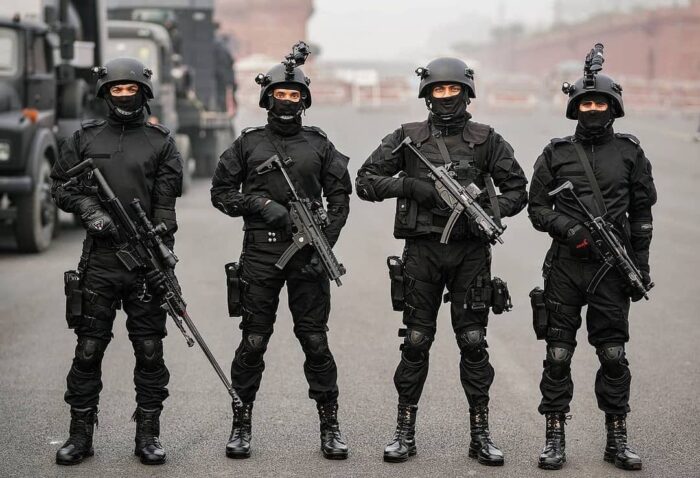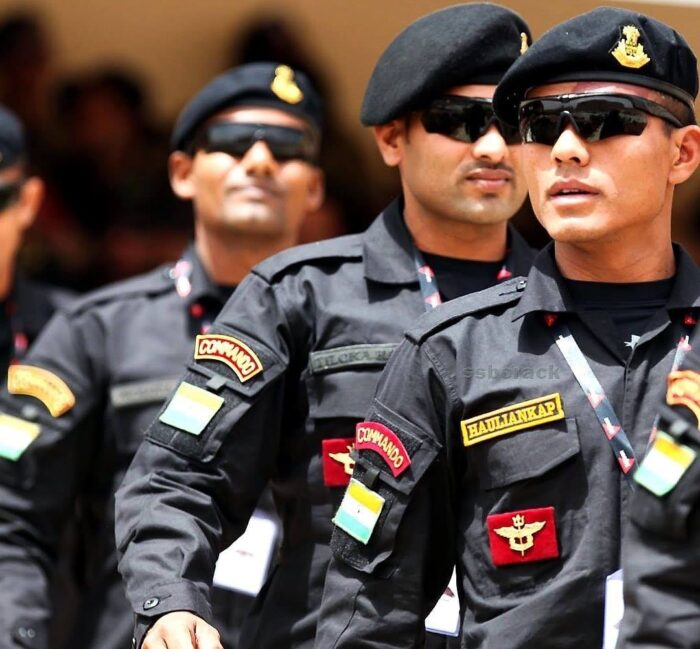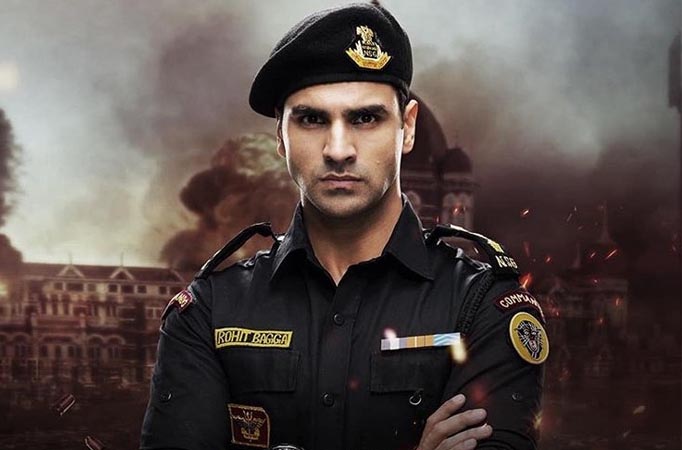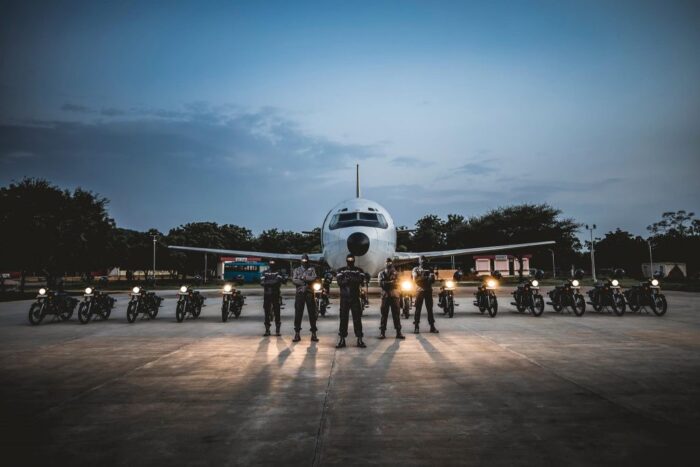How to Become a NSG Commando – National Security Guards
The National Security Guard (NSG) is a federal contingency force renowned for its world-class capabilities and a zero-error approach. The NSG is purposefully equipped and highly trained to handle various anti-terrorist scenarios comprehensively. It is reserved for use in exceptional circumstances, specifically to counteract and prevent significant acts of terrorism.
Motto: “Everywhere, Excellence in Protection.”
Ethos: The NSG’s guiding principles are based on the following:
- Pursuit of excellence.
- Leading from the front.
- Zero tolerance for errors.
- Emphasizing speed, surprise, stealth, precision, and accuracy as its distinguishing characteristics.

How to Become a NSG Commando
Table of Contents
The National Security Guards (NSG), recognized for their formidable counter-terror operations, fall under the jurisdiction of India’s Ministry of Home Affairs. Popularly referred to as “Black Cat Commandos,” the NSG’s primary responsibilities include tackling terrorist threats, responding to hijacking situations, and conducting rescue operations.
Recruitment for this Special Forces unit draws individuals from various branches of the armed forces. Selected candidates undergo a rigorous four-month training program in Manesar, Haryana, which is designed to cultivate resilience and fearlessness. Only those who successfully complete the entire training regimen are then assigned to specific roles within the organization. The NSG’s intense training program boasts a dropout rate of over 50%, contributing to its status as one of the world’s elite Special Forces.
Recruitment for the NSG occurs through two avenues: from the Indian Army and from India’s armed police forces.
Special Action Group
A significant portion of the NSG is composed of individuals from the Indian Army, comprising more than half of the total force. Aspiring candidates seeking entry into the NSG can seize a golden opportunity by first joining the Indian Army. The recruitment process varies across different positions, ranging from rangers to assistant commandants, with eligibility criteria tailored to each role.
Aspirants can opt for higher-ranking positions by choosing avenues like the Combined Defence Services (CDS), National Defence Academy (NDA), or other pathways that lead to a commission as an officer in the army. Upon joining the army, soldiers may subsequently find a path to join the NSG.
Special Ranger Group
The Special Ranger Group (SRG), which serves as the police segment of the NSG, comprises personnel drawn from the Central Armed Police Forces (CAPF), Indo Tibetan Border Police (ITBP), and the Rapid Action Force. Its primary mission involves providing security to VIP individuals. The SRG’s main role is to support the Special Action Group (SAG). Soldiers typically return to their parent organizations after a period of 3-5 years to maintain the NSG’s youthful profile.
Aspiring individuals interested in joining the NSG through this avenue can apply for the Central Armed Police Forces (Assistant Commandant) examination conducted by the Union Public Service Commission (UPSC), the Central Police Organizations (CPO) examination by the Staff Selection Commission (SSC), or through direct recruitment rallies in CAPF forces. Induction into these forces can serve as a stepping stone towards gaining entry into the NSG.

For individuals aspiring to join special forces like the Paramilitary forces, GARUD, MARCOS, and other elite units, the typical pathway involves first gaining entry into the Indian Armed Forces. After securing a position in the armed forces, individuals can then strive to join these specialized and highly trained units.
History of NSG :-
In 1984, the Union Cabinet made a significant decision to establish a Federal Contingency Force. This force would consist of highly motivated, specially equipped, and well-trained personnel, with the primary purpose of addressing various forms of terrorism. In June 1984, the foundational elements, including the Director General of NSG, were approved, and the process of raising the force was set into motion.
Subsequently, in August 1986, a bill for the creation of this organization was introduced in the parliament, and it received the assent of the President on September 22, 1986. It was from this date that the National Security Guard (NSG) was officially established.
The fundamental philosophy of the National Security Guard (NSG) centers around executing swift and rapid operations followed by an immediate withdrawal from the theater of action. The NSG has been assigned a specific role as a Federal Contingency Force, charged with managing all aspects of terrorism anywhere in the country.
The NSG’s framework draws inspiration from the SAS of the UK and GSG-9 of Germany, aligning itself with their operational models. It operates as a mission-focused force, featuring two complementary components: the Special Action Group (SAG), comprised of Army personnel, and the Special Ranger Groups (SRG), which include personnel from the Central Armed Police Forces and State Police Forces.

The NSG has a proven track record of successful operations and maintains its capability to handle a wide range of challenging situations. Its soldiers undergo rigorous training that instills a level of resilience that can be described as unbreakable. While many individuals aspire to join the NSG, a significant number fail to make the cut due to the demanding training and stringent qualification requirements.
Training Centers of NSG –
Established on October 15, 1985, the Training Centre plays a pivotal role in training NSG probationers and enhancing the capabilities of State Police Forces, adapting to the evolving and multifaceted threats posed by terrorism.
This Training Centre holds a prominent national standing as the exclusive federal Counter-Terrorism (CT) Force training institute in the country. It achieves this distinction by skillfully combining the expertise of Central Armed Police Forces (CAPFs) and units of the Indian Army. Its recognition as the de facto Center of Excellence for urban counter-terrorism, bomb detection, and disposal underscores the high standards of training it provides.
The Training Centre serves as a prime example of seamless synergy and collaboration between Para Military Forces and the Army. It delivers world-class CT skills, including bomb disposal and counter-IED training, along with various specialized courses. Furthermore, the Centre conducts joint exercises for CAPFs, State Police Organizations, and Counter-Terrorism Forces from friendly foreign countries.
The Training Centre has established itself as a prestigious institution for Counter-Terrorism training within the country. Recently, the Government of India has introduced new training centers in various regions of the nation.

The National Security Guard (NSG), renowned as a “World-Class Zero Error Force,” comprises officers and personnel from the Army, Central Armed Police Forces, and State Police Forces. Since its inception in 1984, the NSG has demonstrated unwavering commitment and selfless service to the nation. Through its relentless dedication, rigorous training, and remarkable operational accomplishments, the NSG has emerged as a formidable and highly capable force.
The Black Cat Commandos of the NSG have consistently displayed exceptional courage and proficiency in executing their missions, regardless of the time or location. The NSG remains resolute in its commitment to always be prepared to confront any challenge, ensuring the security of the nation, and living up to its motto, “Sarvatra Sarvottam Suraksha” — Security Excellence Everywhere.
You can prepare for SSB interviews and defense entrance exams such as NDA, AFCAT, INET, and CDS by enrolling in online courses. These courses offer full-length, high-quality lectures and provide the opportunity to take standardized mock tests to enhance your study and strategic preparation for the exams. You can also take multiple quizzes after each lesson to ensure a comprehensive understanding of the subject, and even create personalized lesson plans.
For further information on course content and other important details, you can visit the MKC Learning App. Access to these resources is also available through the MKC Learning App, which can be found on the Google Play Store.
Jai Hind!








